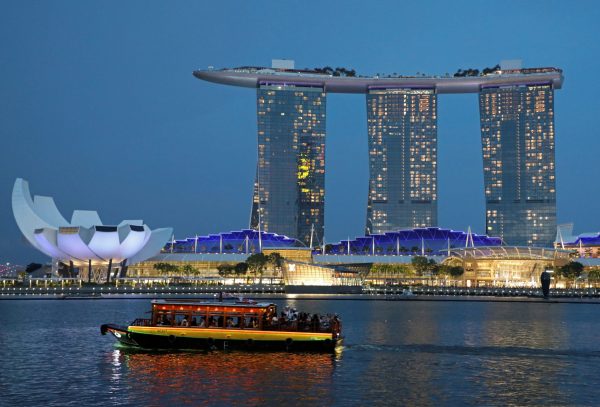While the People’s Action Party (PAP), which has governed since independence, can orchestrate a smooth power transition domestically, the next prime minister faces a turbulent external security environment resulting from unpredictable leadership in other areas of the world. Two key threats dominate Singapore’s geo-strategic landscape — the US–China rivalry and the rising ethno-Islamic influence in the domestic politics of its two closest neighbours, Malaysia and Indonesia.
The US–China rivalry poses a threat to Singapore’s economy and security. China is challenging the United States’ military and economic hegemony in Asia and is shaping the regional order in its favour. A case in point is China’s naval modernisation — China may field four to six aircraft carriers and up to 60 light frigates in the near future.
US efforts to keep in check a rising China place Singapore in a conundrum.
On the one hand, China is Singapore’s top trading partner. The current US–China trade disputes have already adversely impacted Singapore’s economy.
On the other hand, the United States plays a key role in the island state’s security. Singapore hosts the US Navy’s logistics and warships operating in the region and its close security relationship with the United States has led China to believe that the island state would work with Washington if an armed conflict emerged in the region. In the event of a conflict, China’s military may target regional bases used by the US military, including those in Singapore.
Regional leadership also appears to be heading in a concerning direction for Singaporean interests. Domestic developments in its mostly Islamic neighbourhood suggest trouble for the Chinese majority Singapore.
In Malaysia, the Pakatan Harapan (PH) government that ousted the Malay–Muslim dominated Barisan Nasional (BN) is struggling to win over the majority Malay–Muslim electorate. The lead party of the defeated BN coalition, the United Malays National Organisation (UMNO), has chosen an opposition strategy focused on garnering ethnic Malay votes. This includes partnering with the conservative Pan-Malaysian Islamic Party (PAS) that is advancing a revitalised Malay–Muslim supremacy agenda. In the words of one UNMO member, ‘for the sake of political survival, I need to put [the] priorities of Malays and Islam first, then multiracialism’.
Islamic influence has also regained traction as a critical force within Indonesian politics. To ward off the threat to his re-election bid posed by an opposition candidate with strong Islamic credentials, President Joko Widodo appointed Islamic leader Ma’ruf Amin as his running mate in the recent presidential election despite Ma’ruf’s poor record in his dealings with minority religious groups. Growing Malay supremacy and Islamic influence within Malaysia and Indonesia will impact Singapore’s domestic social cohesion and domestic security.
If history is a good indicator, Malaysian and Indonesian foreign policies shaped by domestic ethnic Malay supremacy and Islamic influence will be detrimental to a Chinese-majority Singapore. Past incidents have shown that to shore up domestic ethnic–religious support, political players in these two countries sometimes intervene in Singapore’s domestic political landscape, especially when Singapore’s Malay–Muslim community are affected.
In 1996, then Malaysian prime minister Mahathir Mohamad criticised Singapore over its discrimination of Malays in the Singapore Armed Forces. And in 1999, then Indonesian president B.J. Habibie accused the PAP government of racism.
Great power rivalry and the Malay supremacy narrative within the region are not new threats facing Singapore. The island state left Malaysia in 1965 amid the rivalry between the United States and the Soviet Union and a region besieged by military conflicts. The end of the Indonesian confrontation in 1966 drew Malaysia and Indonesia closer on the basis of Malay Brotherhood — a concern to a Chinese-majority multi-ethnic Singapore.
An Indonesian official at the time pointed out that ‘Singapore would need to adjust its relations with Malaysia and Indonesia in order to fit the circumstances of the region’. Despite the turbulent security outlook then, Lee Kuan Yew and the first PAP leadership successfully developed Singapore.
Heng’s approach to governance is consistent with PAP’s past and current creed — he is likely to prioritise PAP dominance and economic development, rather than political plurality, as best for the country. As the PAP is the dominant political organisation in Singapore, Heng’s ascendency to the prime ministership will likely be smooth.
By contrast, the tumultuous external security outlook could be a baptism of fire for the new prime minister. The question is whether Heng and his team will be able to replicate the statesmanship of Lee Kuan Yew and the first PAP leadership that served Singapore so well during the turbulent 1960s and 1970s.
Abdul Rahman Yaacob is a PhD candidate at the National Security College, the Australian National University.

